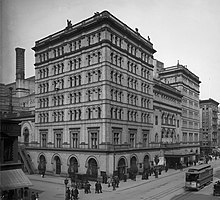Nino Martini
Nino Martini | |
|---|---|
RCA Victor |
| External audio | |
|---|---|
Nino Martini (7 August 1902 – 10 December 1976) was an Italian operatic tenor. He began his career as an opera singer in Italy before moving to the United States to pursue an acting career in films. He appeared in several Hollywood movies during the 1930s and 1940s while simultaneously working as a leading tenor at the Metropolitan Opera in New York City.[1]
Life and career
Martini studied singing under Giovanni Zenatello and Maria Gay who were married and both well known opera singers. In 1925 he made his professional opera debut in Milan as the Duke of Mantua in Verdi's Rigoletto. Shortly thereafter he toured Europe as a concert artist appearing in many of the continent's major music centers. While in Paris, he was discovered by the film producer Jesse L. Lasky who engaged him for several Italian-language speaking roles in short films.[2]
In 1929, under the influence of Lasky, Martini immigrated to the United States to pursue a film career. His first appearance was in the Paramount Pictures all-star revue film Paramount on Parade (1930), in which he sang the song "Come Back to Sorrento" in one of the film's Technicolor sequences. This film has been restored by the UCLA Film and Television Archive.[3][4]

Further forays into film were postponed, however, as Martini decided to continue to pursue an opera career. He made his U.S. opera debut in 1931 in Philadelphia.
While performing at the Met, Martini occasionally returned to Hollywood to appear in films, mostly appearing in pictures produced by Lasky. His film credits include Here's to Romance (1935), Music for Madame (1937), and The Gay Desperado (1936). The latter film featured Ida Lupino as his co-star, was directed by Rouben Mamoulian, produced by Jesse Lasky and Mary Pickford, and released by United Artists. His last film appearance was in One Night With You in 1948.[1]
In 1945 Martini portrayed Rodolfo to Grace Moore's Mimì for the inaugural performance of the San Antonio Grand Opera Festival.[5] In the late 1940s and 1950s Martini continued to perform as a singer mostly on the radio. He eventually returned to Italy where he lived in Verona until his death in 1976.[2]
Martini possessed a warm
Recordings
| External audio | |
|---|---|
Martini made a few recordings of opera arias for
Sources
- ^ ISBN 0-8019-5516-5.
- ^ a b c "Martini, Nino". Operissimo (in German). Retrieved 19 April 2024.
- IMDb
- ^ UCLA "Paramount on Parade (Elsie Janis, Supervisor, 1930)", Library Film and Television Archive, cinema.ucla.edu
- ISBN 9780876112977.
Further reading
- Daniele Rubboli (2022). Nino Martini: un veronese tra Metropolitan e Hollywood (in Italian). Modena: Edizioni Artestampa.
External links
- Nino Martini at IMDb
- Nino Martini's recordings, Internet Archive
- Nino Martini, Moviefone
- "The Screen; Nino Martini Tries His Hand at Musical Comedy in The Gay Desperado, at the Music Hall" by Frank S. Nugent, October 9, 1936, The New York Times
